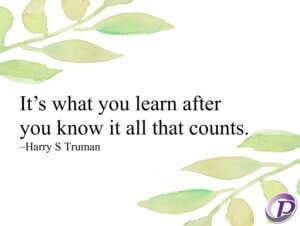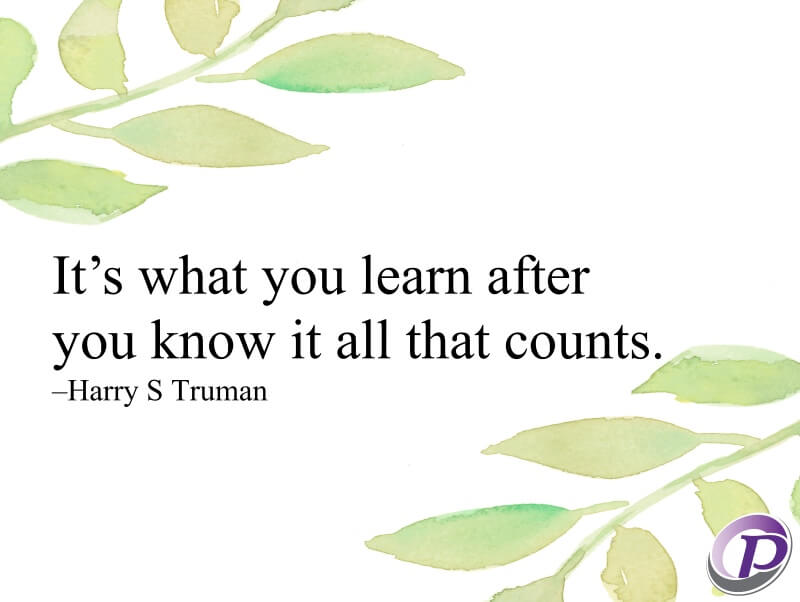
2 min readI Already Knew That
by Guy Gage | October 9, 2022 | Business, Leadership, Performance, Personal Management

There is a difference
When we get feedback from our training, sometimes we get a comment like, “I already knew that.” I have to admit that the comment annoys me a bit, but not for the reason you might think. It’s not because the training wasn’t helpful, insightful or engaging, but that I didn’t do a very good job of differentiating knowing from learning. There is a difference.
Knowing is about information—an intellectual exercise. It’s about retaining knowledge about something. So much of your technical knowhow is about knowledge: the laws, codes and regulations, protocols, methodologies, etc. But just knowing the technical information won’t really help much until you apply what you know to what you do. Managers experience this all the time when they train their staff on technical skills but their staff don’t apply what they know.
Learning, on the other hand, is about doing. Applying what you know is the essence of learning. It’s behavioral, not intellectual. “Knowing about” isn’t the same “able to do.” Here’s an example of the difference.
Illustration
“Humph. Not another training about riding a bicycle! I’ve been through the fundamentals course and bicycle safety training. I’ve read a couple of articles about it. I even watched a YouTube video. In fact, I got a close up look at a bicycle and saw a demonstration of someone riding it. I got it. I don’t need to hear about it again!” But you still can’t ride a bicycle.
I remember conducting a coaching call with 2 senior managers who were working on a firm initiative. Their first action was to influence the decision makers that their project would be helpful to the firm. I suggested that they begin the meeting with a particular skill to get the presentation off to a good start. This skill was covered on two occasions in previous training they had with me. I mentioned it and one of the managers said,” Yeah, I remember hearing about it.” Translated, he admitted, “I heard about it a couple of times, but I haven’t used it. I guess I could go back to the training manual if I needed to.”
This manager knew about the skill, but he never learned it. In fact, he later suggested to his training director that of the training was redundant. Really?
Examples
How much do you know but haven’t learned? How to listen actively? How to respond effectively? How to give feedback appropriately? How to engage clients in difficult conversations? How to help prospects discover their true needs? How to establish credibility in a matter of seconds?
The list is extensive. You’ve heard about all these, and more. You’ve read about them. You’ve seen them demonstrated. You probably have been the recipient when a professional used their skills with you. Yet you fall into the trap of “knowing without learning” something when you:
- Are unable to recognize when you could use it
- Forget to use it
- Proclaim that you are too busy
- Conclude it’s not the right time
- Used it before and it didn’t work.
The next time you are in a learning environment, rather than assess whether you heard about something, ask yourself when was the last time you used it? “I already knew that” is the wrong answer.
Read Related Blogs:
Closing the Year with Gratitude and Renewal
As the calendar winds down, professionals everywhere find themselves reflecting not only on goals achieved but also on the deeper meaning of this season. The end of the year is more than a checkpoint on a timeline - it’s a powerful reminder of resilience, connection,...
Facing The Lions
Our inbred fear response is well-known: when confronted with a perceived danger, our mind and body prepare to fight, flee or freeze. A fairly recent discovery is an additional response called fawning - placating or appeasing to neutralize the threat. While we each...
Strategy Isn’t a Luxury – It’s a Lifeline for CPA Firms
As year-end approaches, we often find ourselves in survival mode - juggling deadlines, client demands, and the whirlwind of the holiday season. It’s tempting to shelve strategic planning until “things calm down.” But here’s the truth: strategy isn’t a luxury reserved...



